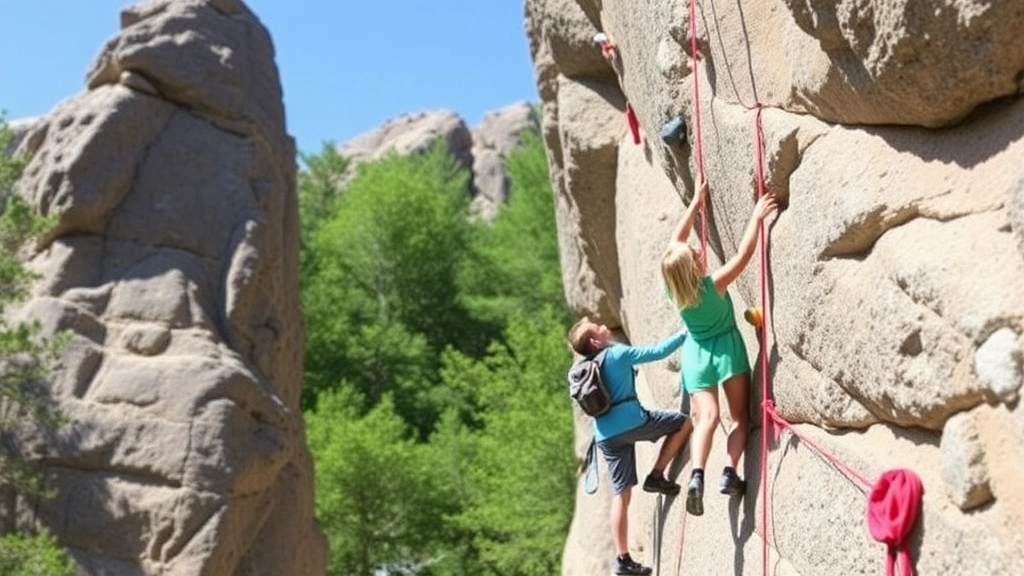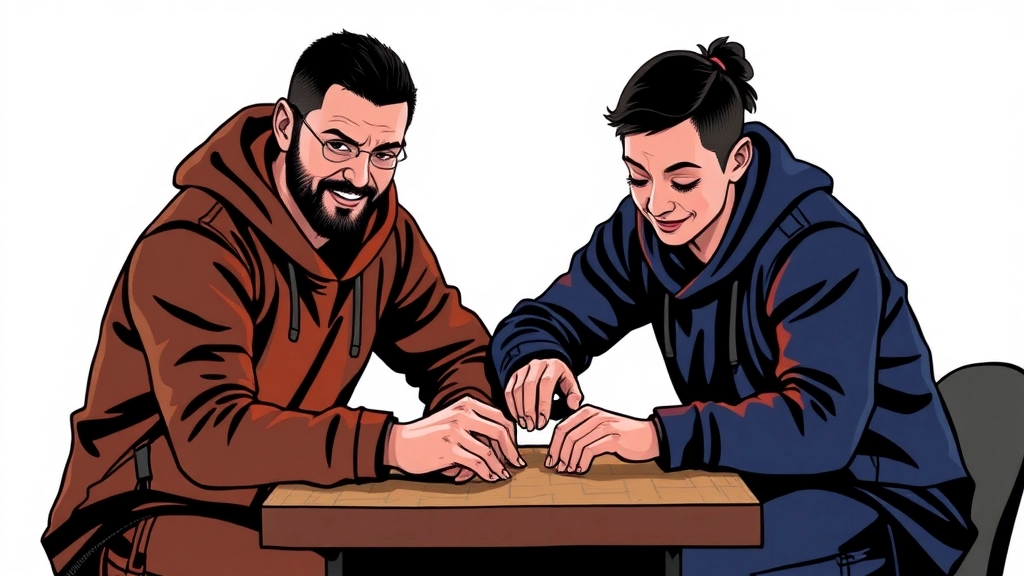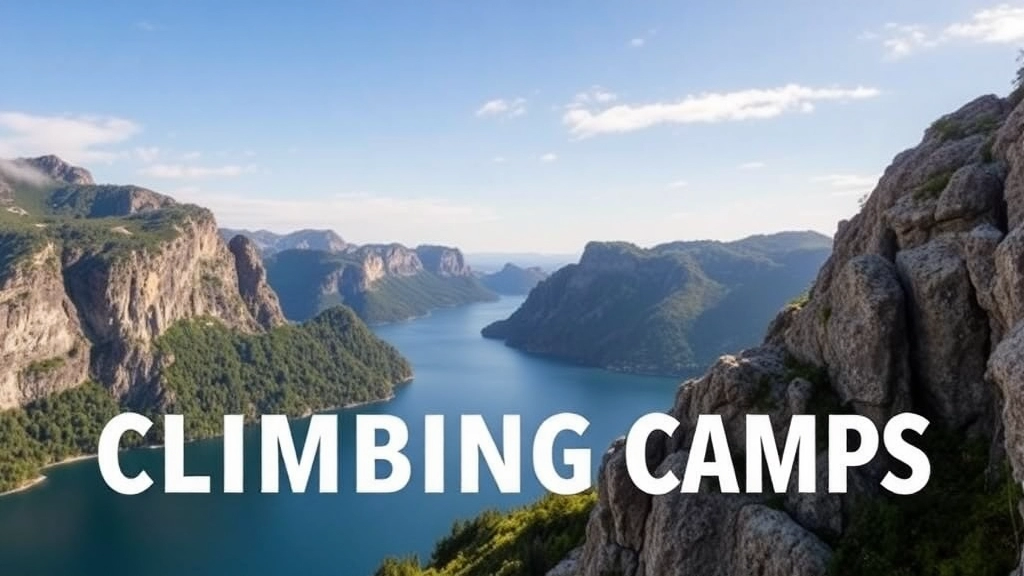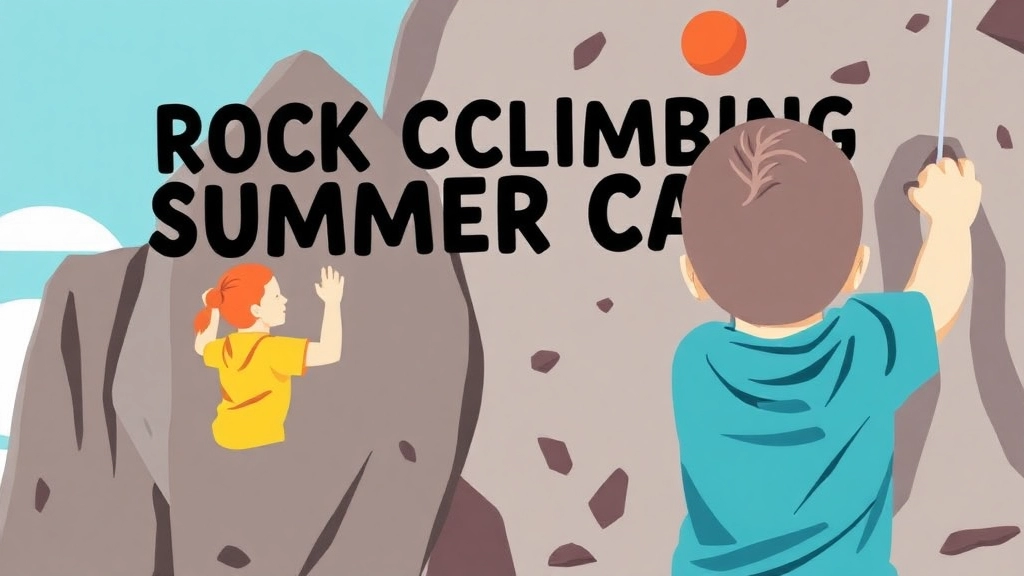Rock Climbing Summer Camps
Thinking about sending your kid to a rock climbing summer camp or maybe you’re the one itching to scale new heights? Either way, picking the right camp can be a game-changer. In this article, we’ll explore everything from choosing the right camp and the benefits of attending, to the types of activities offered, safety measures, and what to pack. We’ll also delve into age groups and skill levels catered to, how to prepare, top destinations, and even real testimonials from camp participants.
Rock climbing summer camps offer more than just a break from the norm—they’re a game-changer for building strength, boosting confidence, and making lifelong friends. Whether you’re a beginner or an advanced climber, these camps provide a variety of activities and skills workshops, all while ensuring top-notch safety measures. We’ll guide you through the registration process, costs, and even share some real-life stories to help you make an informed decision. Ready to conquer new heights? Let’s dive in!
Choosing the Right Rock Climbing Summer Camp
Thinking about sending your kid to a rock climbing summer camp? Or maybe you’re the one itching to scale new heights? Either way, picking the right camp can be a game-changer. But with so many options out there, how do you know which one is the right fit?
Real Questions You Might Have
- Is this camp safe?
- Will it cater to my skill level?
- What kind of activities will I be doing?
- How much is this going to cost me?
Safety First
When it comes to rock climbing, safety is non-negotiable. Look for camps that have:
- Certified Instructors: Make sure the staff has legit certifications like AMGA (American Mountain Guides Association) or similar.
- Safety Gear: Helmets, harnesses, and ropes should be top-notch.
- Emergency Protocols: What’s their plan if something goes wrong? Do they have medical staff on-site?
Skill Levels and Age Groups
Not all camps are created equal. Some are tailored for beginners, while others are for seasoned climbers. Check if the camp offers:
- Beginner Programs: Perfect if you’re just starting out.
- Advanced Courses: For those looking to push their limits.
- Age-Specific Groups: Camps often have different programs for kids, teens, and adults.
Activities Offered
What’s on the agenda? Here’s what you might find:
- Bouldering: Short climbs without ropes, focusing on technique.
- Top-Rope Climbing: Climbing with a rope anchored from above.
- Lead Climbing: More advanced, where you clip the rope as you climb.
- Outdoor vs. Indoor: Some camps offer both, giving a well-rounded experience.
Cost and Registration
Money matters. Here’s what to consider:
- Tuition Fees: What’s included? Meals, gear, and lodging can add up. For more details, check out this guide on summer camp costs.
- Early Bird Discounts: Sign up early and save.
- Payment Plans: Some camps offer flexible payment options.
Testimonials and Reviews
Don’t just take the camp’s word for it. Check out:
- Online Reviews: See what past participants have to say.
- Word of Mouth: Ask around in your climbing community.
For a broader look at different camps, you might find this complete guide to summer camps helpful.
Benefits of Attending a Rock Climbing Camp

Alright, let’s get real.
Why should you even bother with a rock climbing camp?
I mean, it’s summer. You could be lounging by the pool or binge-watching Netflix.
But here’s the thing: rock climbing camps offer more than just a break from the norm.
They’re a game-changer.
Build Strength and Endurance
First off, rock climbing isn’t just about scaling rocks.
It’s a full-body workout.
You’ll build muscle and stamina without even realising it.
Plus, who doesn’t want to come back from summer with killer abs and biceps?
Boost Your Confidence
Ever felt like you’re stuck in a rut?
Climbing can shake things up.
Reaching the top of a tricky climb gives you a rush like no other.
It’s a massive confidence booster.
Learn New Skills
Camps aren’t just about climbing.
You’ll learn:
- Belaying techniques
- Knot tying
- Route planning
These skills translate into better problem-solving abilities in everyday life.
Make Lifelong Friends
You’re not just climbing rocks.
You’re building bonds.
Sharing challenges and victories with fellow climbers creates friendships that last.
Enjoy the Great Outdoors
Forget the gym.
Rock climbing camps take you to some of the most stunning locations.
You’ll get a healthy dose of fresh air and nature.
Mental Health Benefits
Climbing isn’t just physical.
It’s a mental game.
You’ll learn to focus, stay calm under pressure, and push through mental barriers.
Fun and Adventure
Let’s not forget the fun factor.
Rock climbing is an adrenaline rush.
It’s an adventure that beats any summer activity hands down.
Real Stories
Take Jake, for example.
He was a total newbie last summer.
By the end of camp, he was conquering advanced routes and had a bunch of new mates.
He even said it was the best summer of his life.
So, if you’re looking to mix things up, get fit, and have a blast, a rock climbing camp is where it’s at.
You’ll come back stronger, more confident, and with stories to tell.
Types of Rock Climbing Activities Offered
Ever wondered what types of rock climbing activities you can dive into at a summer camp? Well, you’re in for a treat. Rock climbing camps are not just about scaling walls; they’re packed with a variety of activities designed to challenge and thrill you. Let’s break it down, shall we?
Indoor Climbing
Indoor climbing is a great starting point. It’s safe, controlled, and perfect for beginners who want to get a feel for the sport. You’ll find:
- Top-rope climbing: Where the rope is anchored at the top of the climb. It’s all about trust and technique.
- Bouldering: Climbing shorter walls without ropes but with crash mats below. It’s intense, fun, and helps build strength and problem-solving skills.
Outdoor Climbing
Once you’re comfortable indoors, it’s time to hit the real rocks. Outdoor climbing is where the adventure truly begins. Here’s what you can expect:
- Sport climbing: This involves climbing routes that have pre-placed anchors. It’s a mix of safety and adrenaline.
- Traditional (Trad) climbing: For the more experienced, trad climbing is about placing your own gear as you ascend. It’s all about skill and courage.
- Multi-pitch climbing: Imagine climbing a route so long it’s divided into several sections. This is for those who want an all-day adventure.
Specialized Climbing Activities
Beyond the basics, rock climbing camps often offer specialized activities to spice things up:
- Night climbing: Experience the thrill of climbing under the stars with headlamps. It’s surreal and unforgettable.
- Ice climbing: For camps in colder regions, ice climbing on frozen waterfalls or glaciers is an option. It’s challenging but incredibly rewarding.
- Lead climbing: If you’re ready to take the lead, this activity teaches you how to clip your rope into anchors as you climb.
Skills Workshops
To round out your experience, most camps include skills workshops. These are essential for honing your abilities and ensuring safety:
- Rope skills: Learn knots, belaying techniques, and rope management.
- Rescue techniques: Understand how to handle emergencies and perform self-rescues.
- Route planning: Develop the ability to read and plan your climbing routes efficiently.
Why These Activities Matter
You might be wondering why camps offer such a variety. The answer is simple: diversity keeps you engaged and helps you grow. Each activity builds different skills and strengths, making you a well-rounded climber. Plus, it’s just plain fun to mix things up!
Real Stories from Campers
Take it from Sarah, a 15-year-old who attended a rock climbing camp last summer. She started with indoor bouldering and by the end of the camp, she was leading her first outdoor climb. âI never thought I’d be able to climb a real rock face,â she said, âbut the variety of activities and the amazing instructors made it possible.â
For more on exciting camp activities, check out our top 10 exciting summer camp activities. If you’re interested in nature-based adventures, explore our guide on bucolic summer camps.
Safety Measures and Certifications

Worried about safety at a rock climbing camp? You’re not alone.
Safety is a big deal, and it should be.
If you’re sending your kid or even going yourself, you need to know what’s up.
So, let’s break it down.
Why Safety Measures Matter
Rock climbing isn’t like a walk in the park.
It’s thrilling but comes with risks.
That’s why understanding the safety measures in place is crucial.
You want peace of mind, right?
Essential Safety Gear
First things first, what’s the gear situation?
- Helmet: Protects your noggin.
- Harness: Keeps you secure.
- Rope: Your lifeline, literally.
- Carabiners: Connects you to the rope.
- Climbing Shoes: Grip is everything.
Certifications to Look For
Not all camps are created equal.
Here’s what you should look for:
- AMGA Certification: American Mountain Guides Association. These guys know their stuff.
- First Aid Training: Instructors should be certified in first aid and CPR.
- Wilderness First Responder: Extra points if they have this. It’s like first aid on steroids.
Real Stories, Real Peace of Mind
I remember chatting with a parent who was super anxious about sending her 12-year-old to a camp.
She did her homework, found a camp with top-notch safety measures, and guess what?
Her kid came back with stories of adventure, not accidents.
Internal Checks and Balances
Good camps don’t just rely on certifications.
They do internal safety checks.
- Daily Gear Inspections: No worn-out ropes here.
- Safety Drills: Practice makes perfect.
- Emergency Protocols: They’ve got plans for every scenario.
Trust but Verify
Don’t just take their word for it.
- Read Reviews: Look for mentions of safety.
- Ask Questions: How do they handle emergencies?
- Visit if You Can: Get a feel for the place.
Want to know more about choosing the right camp? Check out our section on Choosing the Right Rock Climbing Summer Camp.
Ready to pack? Head over to What to Pack for a Rock Climbing Camp for a handy checklist.
What to Pack for a Rock Climbing Camp
Alright, let’s dive straight into it. What do you really need to pack for a rock climbing camp? This isn’t just about throwing a bunch of stuff in a bag and hoping for the best. You want to be prepared, comfortable, and ready to tackle those rocks like a pro. So, let’s break it down.
Essentials You Can’t Forget
First off, rock climbing gear. If you’re a newbie, the camp might provide some of this, but it’s always good to have your own stuff:
- Climbing shoes: These need to fit snugly. Trust me, you’ll thank me when you’re halfway up a cliff.
- Harness: Make sure it’s adjustable and comfortable.
- Chalk and chalk bag: Sweaty hands? No thanks.
- Helmet: Safety first, always.
Clothing: Comfort Meets Functionality
You can’t just wear anything. Here’s what you’ll need:
- Moisture-wicking shirts: Keeps you dry and cool.
- Climbing pants or shorts: Stretchy and durable.
- Layers: Think lightweight jackets or hoodies. Weather can be unpredictable.
- Socks: Wool or synthetic. Avoid cotton.
Personal Items: Keep It Simple
Now, let’s talk about personal items. You don’t want to overpack, but you also don’t want to be caught without the essentials:
- Water bottle: Hydration is key.
- Sunscreen and lip balm: Sunburn can ruin your day.
- First aid kit: Just the basics â band-aids, antiseptic wipes, painkillers.
- Snacks: High-energy, easy-to-carry options like nuts, dried fruit, and energy bars.
- Toiletries: Toothbrush, toothpaste, deodorant. You know the drill.
Tech and Gadgets: Keep It Minimal
You don’t need a lot of tech, but a few items can make your life easier:
- Headlamp: In case you’re climbing early morning or late evening.
- Phone: For emergencies and, let’s be real, those epic selfies.
- Portable charger: Keep your devices juiced up.
Extras: The Little Things That Matter
These might not be essentials, but they can make your camp experience way more enjoyable:
- Journal and pen: Document your climbs and thoughts.
- Camera: If you’re into photography.
- Book or e-reader: For downtime.
Packing Tips: Keep It Organised
- Use packing cubes: Keeps everything tidy and easy to find.
- Roll your clothes: Saves space and reduces wrinkles.
- Check the weather: Pack accordingly. No one wants to be caught in the rain without a jacket.
So, there you have it. Everything you need to pack for a rock climbing camp. Keep it real, keep it simple, and focus on what you’ll actually use. Remember, the keyword here is prepared. You don’t want to be that person who forgot their climbing shoes or ran out of water halfway through the day. Happy climbing!
If you’re looking for more tips on outdoor adventures, check out our Summer Camping Top Tips & Gear Essentials. And for those planning a family trip, our guide on Queens College Summer Camp is a must-read!
Age Groups and Skill Levels Catered

Ever wondered if a rock climbing camp is right for you or your kid?
Let’s break it down.
Who can join?
Rock climbing camps cater to a wide range of age groups and skill levels.
Whether you’re a complete newbie or a seasoned climber, there’s a spot for you.
Age Groups
- Kids (7-12 years): Perfect for young adventurers. They get to learn the basics in a fun, safe environment.
- Teens (13-17 years): More advanced climbs and techniques. Great for those looking to push their limits.
- Adults (18+): Yep, grown-ups can join too. Whether you’re looking to start a new hobby or refine your skills, there’s something for everyone.
Skill Levels
- Beginners: Never climbed before? No problem. Camps offer beginner classes to get you started.
- Intermediate: Got some experience but want to improve? Intermediate sessions focus on technique and stamina.
- Advanced: For those who live and breathe climbing. Advanced courses cover complex routes and advanced safety measures.
Why does this matter?
Choosing the right camp based on age and skill level ensures you get the most out of your experience.
You wouldn’t want your 8-year-old in a group with advanced climbers, right?
What to expect?
- Kids: Learn through play. Think obstacle courses and easy climbs.
- Teens: More challenging climbs. Focus on technique and teamwork.
- Adults: Tailored to your skill level. Whether it’s your first climb or your hundredth, you’ll find something that suits you.
Real Talk
I remember my first camp. I was a teen, eager but clueless.
The camp had a mix of ages and skills, but the instructors made sure everyone felt included.
That’s the beauty of these camps—they cater to everyone.
Internal Linking Opportunity
Curious about what to pack? Check out our What to Pack for a Rock Climbing Camp section.
Finding the right age group and skill level is crucial for a great camp experience.
So, whether you’re 7 or 70, a beginner or an expert, there’s a rock climbing camp out there for you.
Ready to find your perfect fit?
Dive into our Top Destinations for Rock Climbing Camps to get started.
How to Prepare for a Rock Climbing Camp
So, you’re thinking about heading to a rock climbing camp, but you’re not sure how to get ready? No worries, mate â I’ve got you covered. Preparing for a rock climbing camp can feel a bit overwhelming, but let’s break it down into manageable chunks.
First off, why’s preparation even important? Well, showing up prepared means you’ll get the most out of your camp experience. You’ll be safer, more comfortable, and ready to tackle those rock faces with confidence.
Understand the Basics
Before you even pack your bags, get a grip on the basics of rock climbing. Do some research, watch a few videos, or even hit up a local climbing gym. This way, you won’t be a total newbie when you arrive at camp.
Physical Conditioning
Climbing isn’t just about strength; it’s about endurance, flexibility, and technique. Here’s how you can get in shape:
- Cardio Workouts: Running, cycling, or swimming to build stamina.
- Strength Training: Focus on core, legs, and upper body â think pull-ups, squats, and planks.
- Flexibility Exercises: Yoga or stretching routines to keep your muscles limber.
Gear Up
Most camps provide the essential gear, but having your own can make a big difference. Here’s a quick list of what you might need:
- Climbing shoes: Essential for grip and comfort.
- Chalk bag: Keeps your hands dry.
- Harness: Your lifeline â make sure it fits well.
- Helmet: Safety first, always.
Mental Prep
Climbing isn’t just physical; it’s a mental game too. Visualise yourself climbing, overcoming obstacles, and reaching the top. Confidence is half the battle.
Learn the Lingo
Rock climbing has its own language. Terms like “belay,” “crux,” and “pitch” will pop up. Familiarise yourself with these terms so you’re not scratching your head when someone throws them your way.
Pack Smart
Packing for a rock climbing camp? Here’s your checklist:
- Clothing: Moisture-wicking and comfortable. Layers are key.
- Footwear: Besides climbing shoes, bring comfy shoes for downtime.
- Hydration and Snacks: Always stay hydrated and fuelled.
- First Aid Kit: Better safe than sorry.
- Personal Items: Sunscreen, insect repellent, and any medications.
Set Realistic Goals
What do you want to achieve at camp? Whether it’s mastering a particular technique or just having fun, setting goals can keep you focused and motivated.
Connect with Fellow Climbers
If possible, connect with other participants before the camp. This can be through social media groups or forums. Sharing tips, experiences, and even carpooling can enhance your camp experience.
For more tips on making the most of your summer camp experience, check out our Summer Camp Schedule Activities and Themes Guide. And if you’re looking for some fun and creative ideas to bring along, don’t miss our Summer Camp Craft Ideas for All Ages.
Top Destinations for Rock Climbing Camps

Ever wondered where the best rock climbing camps are? Let’s dive into the top spots where you can level up your climbing game.
Why Choose the Right Destination?
Choosing the right location can make or break your experience. You want thrilling climbs, stunning views, and a supportive community. But where do you start?
Top Climbing Camp Destinations
Here’s a list of some top-notch places you should consider:
1. Yosemite National Park, USA
- Iconic granite cliffs
- Perfect for all skill levels
- Rich climbing history
2. Kalymnos, Greece
- Stunning coastal views
- Endless routes for sport climbing
- Warm, friendly atmosphere
3. Arapiles, Australia
- Unique rock formations
- Great for traditional climbing
- Welcoming climbing community
4. Chamonix, France
- Alpine climbing paradise
- Mix of rock, ice, and snow
- Legendary climbing culture
5. Red River Gorge, USA
- Sandstone cliffs
- Variety of routes
- Ideal for sport climbing
What Makes These Places Stand Out?
- Variety of Routes: From beginner to expert, there’s something for everyone.
- Scenic Beauty: Climb with breathtaking views as your backdrop.
- Community Vibe: Meet fellow climbers and make lasting friendships.
Real Stories from Climbers
I remember chatting with a climber who raved about Kalymnos. She said, “The climbs are as warm as the people.” That’s the kind of vibe you want!
Testimonials and Reviews from Camp Participants
Ever wondered if a rock climbing summer camp is worth it? Well, you’re not alone. Many people worry about whether their time and money will pay off. So, let’s dive into some real-life testimonials and reviews from folks who’ve been there, done that, and got the climbing chalk to prove it.
Real Stories from Real Climbers
“Best Summer Ever!”
I had my doubts before signing up for a rock climbing camp. Would it be too intense? Would I fit in? But let me tell you, it was the best summer ever! The instructors were super friendly and made sure everyone felt included, no matter their skill level. I learned so much and made friends for life. – Sarah, 16
“Transformed My Climbing Skills”
Before attending the camp, I was stuck at a plateau in my climbing abilities. The coaches at the camp provided personalised feedback that helped me overcome my weaknesses. The variety of climbing activities was amazing, from bouldering to lead climbing. I came back home with a newfound confidence. – Jake, 22
What Makes These Camps Stand Out?
Instructors Who Care
Participants rave about the instructors. They’re not just skilled climbers; they’re passionate teachers who genuinely care about your progress. You’ll get:
- Personalised coaching
- Encouragement and support
- Tips tailored to your skill level
A Community Vibe
One thing that keeps coming up in reviews is the sense of community. You’re not just a participant; you become part of a climbing family. Expect:
- Group activities that build camaraderie
- Social events and campfires
- Lifelong friendships
Overcoming Fears and Building Confidence
“I Conquered My Fear of Heights”
I was terrified of heights, but the supportive environment at the camp helped me overcome my fear. The staff were patient and never pushed me beyond my comfort zone. By the end of the camp, I was climbing routes I never thought possible. – Emma, 14
“Perfect for Beginners and Pros Alike”
I was worried the camp would be too basic for me, but they had advanced routes and challenges that pushed my limits. It was perfect for both beginners and experienced climbers. – Tom, 30
The Impact on Personal Growth
“More Than Just Climbing”
This camp was about more than just rock climbing. It taught me resilience, problem-solving, and teamwork. These are skills I’ll carry with me for the rest of my life. – Lily, 18
“A Life-Changing Experience”
I went in expecting a fun summer, but I came out with a life-changing experience. The challenges I faced on the rock translated into a newfound confidence in my everyday life. – Mark, 25
Registration Process and Costs
Thinking about signing up for a rock climbing camp but not sure where to start?
Let’s break it down.
First off, the registration process is usually straightforward.
Most camps have online forms.
You’ll need to provide basic info like name, age, and emergency contacts.
Some camps might ask about your climbing experience.
Pro tip: Be honest about your skill level. It helps them place you in the right group.
Next up, the costs.
This can vary widely.
Here’s a quick breakdown of what you might expect:
- Basic Camp Fees: This covers your stay, meals, and basic climbing activities.
- Equipment Rentals: If you don’t have your own gear, you’ll need to rent. This can add up.
- Travel Costs: Depending on the camp’s location, factor in travel expenses.
- Extra Activities: Some camps offer additional activities like advanced climbing courses or excursions. These usually cost extra.
Real talk: Rock climbing camps aren’t cheap, but they’re a solid investment in your climbing skills and overall experience.
A quick example:
I once signed up for a camp in the Lake District. The base fee was £500 for a week. I had to rent some gear, which added another £100. Travel cost me around £50. So, all in, I spent about £650. Worth every penny.
How to save a bit:
- Early Bird Discounts: Many camps offer discounts if you book early.
- Group Rates: Signing up with friends? Some camps offer group discounts.
- Scholarships: Some camps provide financial aid. It’s worth asking.
Final steps:
Once you’ve filled out the form and paid the fees, you’ll usually get a confirmation email with all the details.
Keep an eye out for any follow-up emails.
They often contain important info about what to bring and how to prepare.
In summary:
- Register online, be honest about your skill level.
- Understand the costs: basic fees, rentals, travel, extras.
- Look out for discounts and scholarships.
- Confirm your registration and stay updated.
Boom, you’re all set!
Ready to tackle those rocks? Check out our guide on summer camp costs for more details. And if you’re looking for some healthy snacks to pack, we’ve got you covered!
FAQs about Rock Climbing Summer Camps
What are the main benefits of attending a rock climbing summer camp?
Rock climbing camps offer a variety of benefits including building strength and endurance, boosting confidence, learning new skills, making lifelong friends, enjoying the great outdoors, improving mental health, and experiencing fun and adventure.
What safety measures are in place at rock climbing camps?
Safety is a top priority at rock climbing camps. Essential safety gear includes helmets, harnesses, ropes, carabiners, and climbing shoes. Look for camps with certifications such as AMGA, first aid training, and Wilderness First Responder. Camps also perform daily gear inspections, safety drills, and have emergency protocols.
What age groups and skill levels do rock climbing camps cater to?
Rock climbing camps cater to a wide range of age groups and skill levels. Age groups include kids (7-12 years), teens (13-17 years), and adults (18+). Skill levels range from beginners to advanced climbers, ensuring everyone can find a suitable program.
What are some top destinations for rock climbing camps?
Some top destinations for rock climbing camps include Yosemite National Park (USA), Kalymnos (Greece), Arapiles (Australia), Chamonix (France), and Red River Gorge (USA). These locations offer a variety of routes, stunning views, and a supportive climbing community.
What skills can I expect to learn at a rock climbing camp?
At a rock climbing camp, you can expect to learn various skills such as belaying techniques, knot tying, and route planning. These skills not only enhance your climbing abilities but also improve your problem-solving skills in everyday life.
How can I ensure the camp is safe for my child?
To ensure the camp’s safety, look for certifications like AMGA and first aid training. Read reviews, ask detailed questions about their safety measures, and visit the camp if possible. Camps with robust internal checks, daily gear inspections, and safety drills are preferable.
What should I pack for a rock climbing camp?
Packing essentials for a rock climbing camp include climbing shoes, harness, helmet, comfortable clothing, sunscreen, water bottle, and a first aid kit. For a detailed checklist, refer to our What to Pack for a Rock Climbing Camp section.
Can adults join rock climbing summer camps?
Yes, adults can join rock climbing summer camps. Whether you are looking to start a new hobby or refine your skills, there are programs tailored for adults of all skill levels.
How do I choose the right rock climbing camp?
Choosing the right camp involves considering factors like age group, skill level, safety measures, and location. For more detailed guidance, check out our section on Choosing the Right Rock Climbing Summer Camp.
Are there any mental health benefits to rock climbing?
Yes, rock climbing offers significant mental health benefits. It helps improve focus, stay calm under pressure, and push through mental barriers. The sense of achievement from reaching the top of a climb can also be a massive confidence booster.
References
-
Yosemite National Park – National Park Service
-
Kalymnos Climbing – PlanetMountain
-
Arapiles Climbing Guide – theCrag

